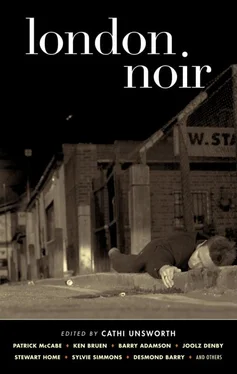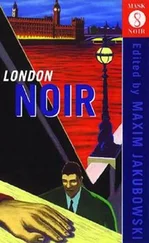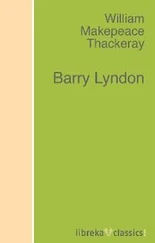Desmond Barry - London Noir
Здесь есть возможность читать онлайн «Desmond Barry - London Noir» весь текст электронной книги совершенно бесплатно (целиком полную версию без сокращений). В некоторых случаях можно слушать аудио, скачать через торрент в формате fb2 и присутствует краткое содержание. Город: New York, Год выпуска: 2006, ISBN: 2006, Издательство: Akashic Books, Жанр: Детектив, на английском языке. Описание произведения, (предисловие) а так же отзывы посетителей доступны на портале библиотеки ЛибКат.
- Название:London Noir
- Автор:
- Издательство:Akashic Books
- Жанр:
- Год:2006
- Город:New York
- ISBN:978-1-888451-98-6
- Рейтинг книги:4 / 5. Голосов: 1
-
Избранное:Добавить в избранное
- Отзывы:
-
Ваша оценка:
- 80
- 1
- 2
- 3
- 4
- 5
London Noir: краткое содержание, описание и аннотация
Предлагаем к чтению аннотацию, описание, краткое содержание или предисловие (зависит от того, что написал сам автор книги «London Noir»). Если вы не нашли необходимую информацию о книге — напишите в комментариях, мы постараемся отыскать её.
Cathi Unsworth
Sounds
Melody Maker
Purr
Bizarre
The Not Knowing
London Noir — читать онлайн бесплатно полную книгу (весь текст) целиком
Ниже представлен текст книги, разбитый по страницам. Система сохранения места последней прочитанной страницы, позволяет с удобством читать онлайн бесплатно книгу «London Noir», без необходимости каждый раз заново искать на чём Вы остановились. Поставьте закладку, и сможете в любой момент перейти на страницу, на которой закончили чтение.
Интервал:
Закладка:
This could have been built for us, the self-styled cultists of the city still reeling from our frantic initiations of acid-fueled underground trips, coke-blasted long marches across the city trailed by gibbering crackheads waiting to fire up the crystal snot on our cast-off tissues, graduation only by turning up some new obscurity to which the metropolisomancers can nail a thousand mad-eyed theses. Here, a series of far-sighted planners, true inheritors of the Dionysiac mantle, conspired or were somehow moved by unseen forces to create a playground for those unable to travel through an underpass without pausing to attempt to decode the hidden patterns brought to half-life by every patch of crumbling concrete and piss stain.
It starts as soon as you vanish back underground after emerging from the tube. (No, it starts with the name: Elephant & Castle. Gnomic, at first quaint, then taking on sinister overtones. The Guild of Cutlers, ivory and steel. Bone and knife blade, a union still celebrated here more nights than not.) The subterranean walkways, with their vandalized or opaque signs, are an immediate hook, an obvious nod to Crete — passages which seem carefully planned to evoke the dread that some bellowing theriomorph might lurk behind each blind turn, pure panic .
At some point, in a misguided attempt to defuse these chthonic terrors, murals have been added showing imagined scenes from some non-history of South London, jungle scenes, subaquatic fantasies. Sharks patrol these walls. But the genius loci won’t be denied. It rots the cheer, warps it over time into mania. Each grin now takes on a sinister aspect, the jolly street traders and their well-fed horses projecting an air of vague unease, like nursery drawings on the walls of a burned-out house. Crumbling and fading, they have become a desperate illustration of something that can only be hinted at in the most oblique symbolism, a private, autistic blend of Hoffman and Ryder-Waite.
Between the two stations, I stop to talk to a homeless woman sitting cross-legged with her back to one of the walls. She could be five or six years younger than me, but looks ten older. She has an immense paperback open in front of her, and I ask what she’s reading, steeling myself to be polite about Tolkien or worse. Instead, it’s an anthology of classic detective stories — Chandler, Willeford, Himes — with the words Pulp Fiction blazing across the cover. She explains that she bought it because she thought it was something to do with the film. She’s about halfway through it now. I give her a pound and tell her to put it toward another book.
A pound’s the least I can do; she’s already shading into fiction, working her way into the web of metaphor, a fate not to be wished on any human or bestowed on them without recompense. It’s a kind of death, after all. There was a real woman sitting in the underpass, reading a real book, I did stop, I did speak to her, I did give her the money, but by reducing her to this incident I triumphantly deny her the rest of her life, all the while patting myself on the back for my razor-sharp literary instincts and dreaming of Mayhew.
She was drawn into the book — her anthology, not this fiction, I’m the only one on this particular voyage just now — expecting something other than what she got, but now realizes that she’s better off with what she did get. Enter the labyrinth and confront... The pat answer is usually some reassuringly bleak psychobabble borrowed from half-heard, never-read Freud or, worse, George Lucas — yourself, your parents, your dark side. The truth is that you’re confronting the labyrinth itself, the ultimate manifestation of the journey that becomes its own destination. Anything you may find is a function of the maze.
An information bauble surfaces from the Fortean Times days. A piece by Paul Devereux on a South American temple which was designed as a shaman machine. The initiate would be fed hallucinogenic cactus, then sent into the temple. Each part was set up to accentuate some aspect of the psychedelic experience — walls that went from echoing to acoustically dead, water channels designed to create apparently source-less sounds, weird lights.
The cactus they used, San Pedro, is now widely available in Camden and Portobello Road. But bang a couple of slices of that and venture in here, and I don’t like to think what you’d get. Certainly not the sort of mantic howler in the outer darkness who lands regular spots in the LRB. Any signs one could read here would sear the brain with revelation, a freebase hit of pure kabbalah, rebridging the divisions between left and right cerebral hemispheres and turning the reader into an ambulatory conduit for the voice of the labyrinth.
It continues. I stride edgily through the shopping center to the Thameslink. The whitewashed concrete hallway feels like an abandoned bunker somewhere deep in Eastern Europe. The floor is inches deep in rainwater, with helpful yellow signs to point out this fact. Nobody is there. The nearest thing to human contact comes from the monitors, relaying information keyed in hours ago in some other location, a cathode ray phantom, news from nowhere. I have an hour to wait for the next train. I’ve missed its predecessor by seconds as a consequence of my chat with the homeless woman. (See: She doesn’t even get a name, but the entire narrative really hangs on her; without her, you would not be reading this, or at least not in this form.)
I make for the bus stop, where the bus I need appears within seconds of my discovering that I need it. Another omen, another metaphor. This is a fertile zone; tiny possibility bombs detonating and sending ripples through the various levels of my mind. The people milling around the shopping center (the pink shopping center, a Little England nightmare made of concrete — dusky colonials and the taint of lavender) become a personal message to me from something beyond.
Once on board, I set my eyes on a mysteriously empty seat, one of three unoccupied places around a dozing bulk. It’s a long haul into terra australis incognita, and I’ll be needing my strength later. The instant I sit, I realize why the seats have not been taken up by any of my traveling companions. The man at the center of the exclusion zone smells. No, this barely does him justice. A truly heroic stench hangs around him, displaced each time he moves, sweeping out in almost visible curls before and behind him with every disturbance in his dream.
I deal with it for as long as I can, but eventually change seats (being a good middle-class boy, I wait until I am absolutely sure he is asleep; there is, I reason, no possibility that he is unaware of his miasma, and I have no desire to remind him of it again). From my new vantage point, I see that, in fact, the earlier journey through the tunnels was just a decoy, a warm-up. This, though, is the real deal. There are no signs to help me here, no friendly guides clutching books full of familiar names to ground me. I took my eye off the road and left it without even noticing.
I look briefly at each of the other passengers. Eventually, there is no one left to look at and I am compelled to turn my attention to the man in front of me.
He is sitting back yet leaning forward at the same time. A great buffalo hump squats on his back, forcing his head toward the space between his knees. A woolly brown suit of indiscernible vintage helps add to the air of something bovine. Sagging expanses of flesh the colors of corned beef — complete with waxy marbled patches of fat — droop from an acromegalic frame and turn his face into a system of soft caves. His eyes are almost buried beneath overhanging folds of puffed skin, which threaten to fuse with his cheeks: a waxwork Auden rescued, too late, from a conflagration. Messy spikes of hair protrude from his scalp like a crown of feathers. He is between sleep and waking, and the bus’ occasional stops and starts make him jerk, sending a shudder through his body, which is echoed and enlarged by corresponding movements in the mephitic cloud that clings to him like a swarm of locusts. The breath flaps out of him from behind crimson jowls.
Читать дальшеИнтервал:
Закладка:
Похожие книги на «London Noir»
Представляем Вашему вниманию похожие книги на «London Noir» списком для выбора. Мы отобрали схожую по названию и смыслу литературу в надежде предоставить читателям больше вариантов отыскать новые, интересные, ещё непрочитанные произведения.
Обсуждение, отзывы о книге «London Noir» и просто собственные мнения читателей. Оставьте ваши комментарии, напишите, что Вы думаете о произведении, его смысле или главных героях. Укажите что конкретно понравилось, а что нет, и почему Вы так считаете.










